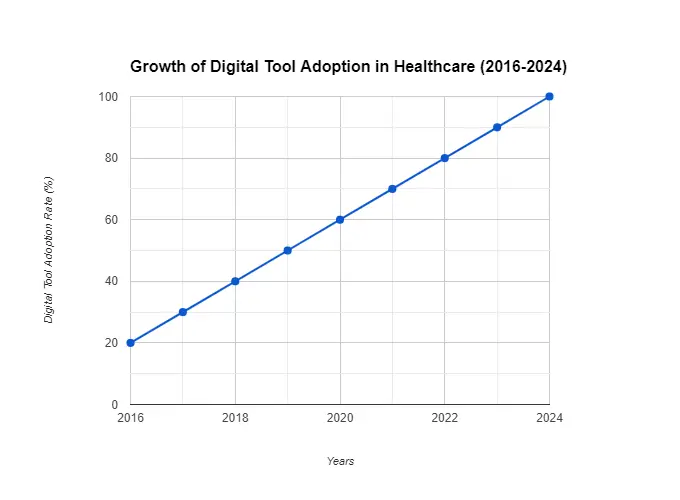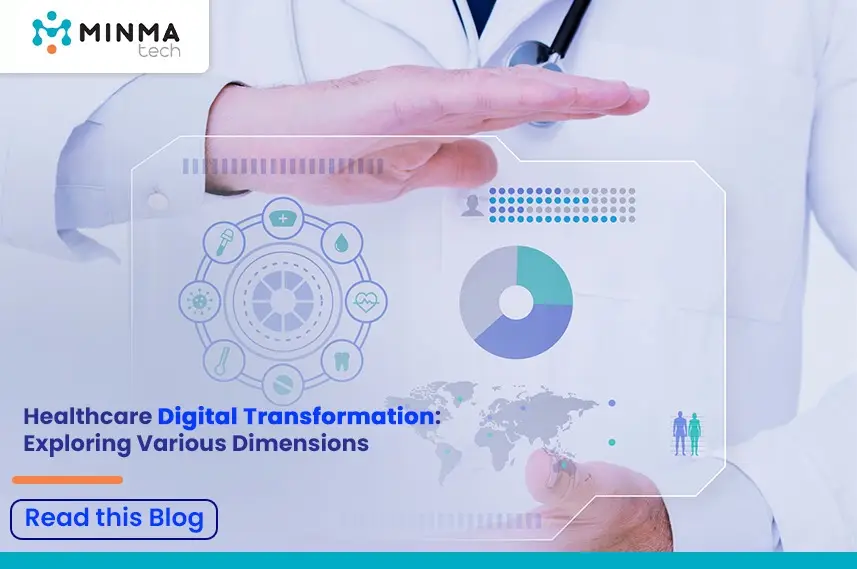Digital transformation in healthcare represents a profound shift in how medical services are delivered, enhancing patient care, streamlining operations, and elevating overall health management through technological advancements. The various dimensions of this transformation not only improve patient outcomes but also reshape healthcare business models and operations.
Let’s delve into these aspects:
Enhancing Patient Care with Digital Technologies
At the core of healthcare digital transformation is the enhancement of patient care. Technologies such as electronic health records (EHRs), telemedicine, and health apps play pivotal roles. EHRs streamline the documentation, storage, and retrieval of patient information, making medical records accessible in real-time to authorized healthcare providers. This immediate access facilitates better and faster clinical decisions.
Telemedicine extends healthcare delivery beyond traditional settings, offering remote consultations and monitoring, which proved especially crucial during the COVID-19 pandemic. A staggering number of global telemedicine users is projected to reach 938 million by 2030 [Statistia, 2023]. This surge reflects the increasing adoption of telemedicine for its convenience and efficiency.
Health apps contribute to patient management by tracking health metrics and facilitating direct communication with healthcare providers, enhancing both engagement and compliance with treatment plans. 57% of smartphone users globally already use health and fitness apps [Statistia, 2022], demonstrating the widespread acceptance of mobile health tools.
Streamlining Administrative Processes
Digital transformation not only improves patient care but also streamlines administrative tasks in healthcare facilities. Electronic health records (EHRs) significantly reduce paperwork for staff, freeing up valuable time to focus on patient interaction and support. A study by HIMSS Analytics in 2023 found that 86% of hospitals in the US already utilize EHRs, highlighting their widespread adoption.
Online patient portals and mobile apps further contribute by empowering patients to manage their healthcare more actively. These tools allow for:
- Appointment scheduling: Patients can conveniently book appointments at their own time, eliminating the need for phone calls or in-person visits.
- Medical information access: Patients can access their medical records, test results, and immunization history readily, fostering a sense of transparency and involvement in their care.
- Medication tracking: Mobile apps can send reminders to take medications and track adherence to treatment plans, improving overall health outcomes.
By reducing administrative burden and fostering patient engagement, digital transformation creates a win-win situation for both healthcare providers and patients.
Advancing Data Management and Security
As healthcare generates vast amounts of data, effective management and security are paramount. Digital technologies help consolidate and manage data, improving the efficiency of clinical workflows and patient tracking. Enhanced data security measures, such as encryption and multi-factor authentication, are crucial in protecting sensitive patient information against breaches and cyber threats.
Overcoming Barriers to Digital Adoption
Despite the benefits, healthcare organizations often face challenges in adopting digital technologies. Resistance from staff, who may be accustomed to traditional practices, and the complexities of integrating new systems with existing ones are significant hurdles. Training and clear communication about the benefits of digital tools can facilitate smoother transitions.
The Future of Healthcare Digital Transformation
Looking forward, digital transformation is set to continue reshaping healthcare. Innovations in AI and machine learning will further refine diagnostics and treatment options, leading to more personalized and precise medical care. The ongoing integration of digital tools will likely usher in more robust, patient-centered healthcare ecosystems that not only improve outcomes but also enhance the efficiency and satisfaction of both patients and healthcare providers.
By embracing these digital dimensions, healthcare organizations can not only improve operational efficiency but also provide a higher standard of patient care, tailored to the needs of the modern patient.
Healthcare Digital Transformation in 2024: A Detailed Exploration
Digital transformation in healthcare continues to evolve, bringing sophisticated solutions that enhance patient care, streamline administrative tasks, and fortify data management and security. Here’s a closer look at the different dimensions as they stand in 2024:
Enhancing Patient Care
The adoption of digital tools in healthcare has seen a remarkable rise. As of 2024, nearly every healthcare provider utilizes some form of digital technology to improve patient outcomes. These technologies include telemedicine, which has drastically reduced the need for in-person visits, and AI-driven diagnostic tools, which provide faster and more accurate diagnoses.
Revolutionized Healthcare Administration
Digital systems have revolutionized healthcare administration. Electronic Health Records (EHRs) have become more integrated and user-friendly, reducing the time spent on administrative tasks and allowing healthcare providers to focus more on patient care.
Advancing Data Management and Security
The importance of data security in healthcare cannot be overstressed. With the vast amounts of sensitive patient data being processed, robust security protocols are essential. In 2024, advancements in encryption and secure data storage technologies continue to safeguard patient information effectively.
Visual Representation
Below is a graph illustrating the significant growth in digital tool adoption among healthcare providers from 2016 to 2024. The graph shows a steady increase, highlighting the sector’s commitment to integrating technology into everyday practices.

Conclusion
As we move through 2024, digital transformation in healthcare remains a key driver for improving the efficiency of healthcare delivery and patient satisfaction. These technologies not only enhance patient care but also ensure operations are more streamlined and data is securely managed. The ongoing adoption and innovation in digital health tools are set to redefine healthcare standards in the coming years.

